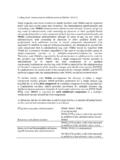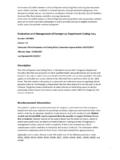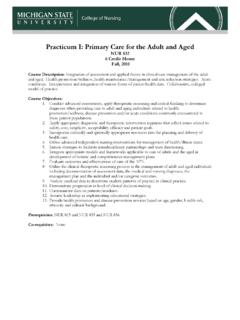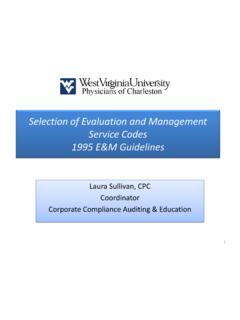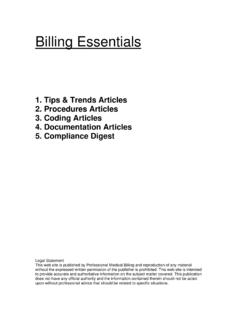Transcription of CPT - Transitional Care Management Services …
1 CPT - Transitional care Management Services (99495-99496) Codes 99495 and 99496 are used to report Transitional care Management Services (TCM). These Services are for an established patient whose medical and/or psychosocial problems require moderate or high complexity medical decision making during transitions in care from an inpatient hospital setting (including acute hospital, rehabilitation hospital, long-term acute care hospital), partial hospital, observation status in a hospital, or skilled nursing facility/nursing facility, to the patient s community setting (home, domiciliary, rest home, or assisted living).
2 TCM commences upon the date of discharge and continues for the next 29 days. TCM is comprised of one face-to-face visit within the specified timeframes, in combination with non- face-to-face Services that may be performed by the physician or other qualified health care professional and/or licensed clinical staff under his/her direction. Non-face-to-face Services provided by clinical staff, under the direction of the physician or other qualified health care professional, may include: communication (with patient, family members, guardian or caretaker, surrogate decision makers, and/or other professionals)
3 Regarding aspects of care , communication with home health agencies and other community Services utilized by the patient, patient and/or family/caretaker education to support self- Management , independent living, and activities of daily living, assessment and support for treatment regimen adherence and medication Management , identification of available community and health resources, facilitating access to care and Services needed by the patient and/or family Non-face-to-face Services provided by the physician or other qualified health care provider may include: obtaining and reviewing the discharge information (eg, discharge summary, as available, or continuity of care documents); reviewing need for or follow-up on pending diagnostic tests and treatments; interaction with other qualified health care professionals who will assume or reassume care of the patient s system-specific problems.
4 Education of patient, family, guardian, and/or caregiver; establishment or reestablishment of referrals and arranging for needed community resources; assistance in scheduling any required follow-up with community providers and Services . TCM requires a face-to-face visit, initial patient contact, and medication reconciliation within specified timeframes. The first face-to-face visit is part of the TCM service and not reported separately. Additional E/M Services after the first face-to-face visit may be reported separately.
5 TCM requires an interactive contact with the patient or caregiver, as appropriate, within two business days of discharge. The contact may be direct (face-to-face), telephonic or by electronic means. Medication reconciliation and Management must occur no later than the date of the face-to-face visit. These Services address any needed coordination of care performed by multiple disciplines and community service agencies. The reporting individual provides or oversees the Management and/or coordination of Services , as needed, for all medical conditions, psychosocial needs and activity of daily living support by providing first contact and continuous access.
6 Medical decision-making and the date of the first face-to-face visit are used to select and report the appropriate TCM code. For 99496, the face-to-face visit must occur within 7 calendar days of the date discharge and medical decision-making must be of high complexity. For 99495, the face-to-face visit must occur within 14 calendar days of the date of discharge and medical decision-making must be of at least moderate complexity. Selection of Code Type of Medical Decision Making Face-to-face visit within 7 days Face to face visit within 8 to 14 days Moderate Complexity 99495 99495 High Complexity 99496 99495 Medical decision-making is defined by the E/M Services Guidelines.
7 The medical decision making over the service period reported is used to define the medical decision making of TCM. Documentation includes the timing of the initial post discharge communication with the patient or caregivers, date of the face-to-face visit, and the complexity of medical decision-making. Only one individual may report these Services and only once per patient within 30 days of discharge. Another TCM may not be reported by the same individual or group for any subsequent discharge(s) within the 30 days. The same individual may report hospital or observation discharge Services and TCM.
8 The same individual should not report TCM Services provided in the postoperative period. A physician or other qualified health care professional who reports codes 99495, 99496 may not report care plan oversight Services ( 99339, 99340, 99374- 99380 ), prolonged Services without direct patient contact ( 99358, 99359), anticoagulant Management ( 99363, 99364), medical team conferences ( 99366- 99368 ), education and training ( 98960- 98962 , 99071, 99078), telephone Services ( 98966- 98968 , 99441- 99443 ), end stage renal disease Services ( 90951- 90970 ), online medical evaluation Services ( 98969, 99444)
9 , preparation of special reports ( 99080), analysis of data ( 99090, 99091), complex chronic care coordination Services ( 99487- 99489 ), medication therapy Management Services ( 99605- 99607 ), during the time period covered by the Transitional care Management Services codes. 99495 Transitional care Management Services with the following required elements: Communication (direct contact, telephone, electronic) with the patient and/or caregiver within 2 business days of discharge Medical decision making of at least moderate complexity during the service period Face-to-face visit, within 14 calendar days of discharge Coding Tip If another individual provides TCM Services within the postoperative period of a surgical package, modifier 54 is not required.
10 The required contact with the patient or caregiver, as appropriate, may be by the physician or qualified health care professional or clinical staff. Within two business days of discharge is Monday through Friday except holidays without respect to normal practice hours or date of notification of discharge. The contact must include capacity for prompt interactive communication addressing patient status and needs beyond scheduling follow-up care . If two or more separate attempts are made in a timely manner, but are unsuccessful and other Transitional care Management criteria are met, the service may be reported.




